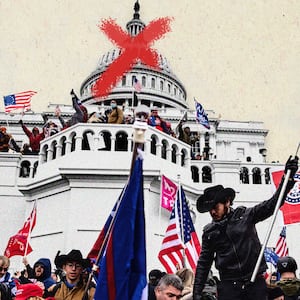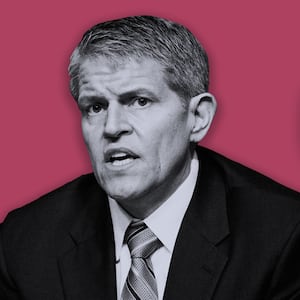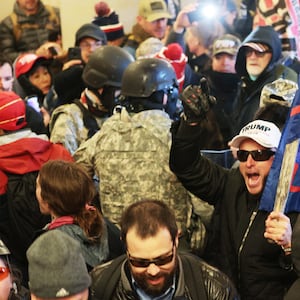Of all the dangers presented by the failed attack on the U.S. Capitol last year, the most ominous is an oft-repeated mantra amongst unapologetic Jan. 6 insurrectionists: Next time, we’ll bring guns.
McCall Calhoun, an attorney in Georgia and so-called Second Amendment activist, earned himself a profile in the Atlanta Journal-Constitution last year when he remarked on the social media site Parler, “They learned that today when we stormed the Capitol and took it. The word is we’re all coming back armed for war.”
And over the weekend, a man who was present for the Jan. 6 rally, Oren Orr, told The New York Times that, “Most everybody thinks we ought to have went with guns, and I kind of agree with that myself.”
If there’s another Jan. 6-like attack on the Capitol, there’s good reason to believe the insurrectionists would be more heavily armed next time—they’d likely have to be to overcome beefed-up security at the Capitol.
But there’s another reason the rioters would have guns: because the government is allowing most of the people guilty of illegally entering the Capitol to keep their firearms.
More than half of the 700-plus arrested so far are not being hit with criminal charges serious enough to keep them from legally owning a gun in the future.
“I absolutely think it’s a missed opportunity. These people have proven that they will take actions against the very democracy itself. Why would you want them armed?” said Ryan Busse, a former gun industry executive.
“I hear all the time: ‘Enforce the laws we have on the books. We don’t want bad guys to get guns.’ Why not do this here? All the people who did this are obviously unstable, borderline treasonous individuals,” added Busse, who warns about the rise in right-wing violence in his book, Gunfight: My Battle Against the Industry That Radicalized America.
In reality, an untold number of rioters already did bring weapons with them on Jan. 6, 2021—they just didn’t get caught.
On far-right forums like TheDonald.win, rioters openly plotted to carry weapons en masse to avoid being singled out and arrested, NPR reported. Daniel Hodges, an officer with the Metropolitan Police Department, testified before Congress that the gun recovery unit was “working constantly” and making arrests, but “unfortunately due to the course of events that day we will likely never know exactly how many were carrying firearms and other lethal weapons.”
Hodges told The Washington Post he resisted shooting at the violent horde—even when fellow cops’ lives were at risk—because he knew they were outnumbered and outgunned.
Attackers kept their pistols holstered. Rioters instead relied on electroshocks from high-voltage stun guns, eye-burning pepper spray, and flagpoles that doubled as spears.
But the concern now is that jailed insurrectionists, emboldened by the belief that they are merely political prisoners, will actually put weapons to use during a future attack on the U.S. Capitol or various state capitols. (An armed right-wing militia already did that with semi-automatic rifles in Michigan in April 2020.)
Federal prosecutors in Washington, D.C., pursuing cases against Jan. 6 insurrectionists have at least one tool at their disposal: felony charges.
It’s illegal for any convicted felon to possess a firearm. It’s an immediate disqualifier during an FBI background check, which is required from every licensed gun shop. And getting caught brings its own criminal charges for the seller and buyer.
But only 350 of the 720 defendants so far have been charged with felonies. The rest face misdemeanors, so they’ll still be able to legally own a gun.
By the time defendants are actually convicted or plead out, the number of felonies could be far fewer than 350. Of the 50 suspected felons who already admitted to their crimes in federal court, half of them managed to knock it down to a misdemeanor, according to the latest data from George Washington University’s Program on Extremism.
“It is difficult to imagine they could have brought felony obstruction charges against all 700 individuals, including a significant group of them who just trespassed into the Capitol, took some photos, then left. It’s serious conduct, but it does speak to the challenge the DOJ is facing,” said Jonathan Lewis, a research fellow there.
Lewis, who has been closely tracking all of the insurrection cases, points to a few examples. Brandon Straka, a New York City hairstylist turned activist, faced felony charges that were bumped down after he admitted to storming the building and egging on others to rip a police officer’s shield from the cop’s hands. Jeffrey Witcher, a U.S. Marine Corps veteran who was so utterly clueless that he thought he had broken into the White House, also initially faced felony charges that were reduced after he admitted to yelling threats at police in the Capitol, saying, “Don’t be a traitor! Fulfill your constitutional duties, man. Do or die!”
Still, the government may have good reason to not systematically target Jan. 6 rioters for felonies that would take away their guns. Scott Tenley, a former federal prosecutor in California with extensive experience investigating gun crimes, said the Justice Department would be unwise to utilize these criminal cases as a way to disarm people. The government is already under fire from prominent voices on the political right, like Fox News host Tucker Carlson, who have minimized the violence that occurred that day.
Besides, Tenley added, it’s unclear whether a felony record would actually stop a segment of the population that keeps being told the rule of law no longer applies.
“Hitting them with a felony doesn't make them unable to show up with a gun. It just makes it illegal,” he told The Daily Beast. “If those 700 people don't have the ability to own guns, that's not going to affect the threat of violence in 2024. There are other circumstances fueling division and making this happen all over again even worse.”
Those most likely to still face prohibitions on gun ownership are the seven rioters who’ve been arrested for actually taking a gun to the attack on the Capitol:
- Samuel Fisher, a New York City pickup artist who was later arrested at his Upper East Side apartment, where he allegedly kept an arsenal.
- Mark Mazza, who allegedly reported his Taurus “The Judge” revolver stolen in his home state of Indiana the day before the insurrection but then showed up with it loaded with shotgun shells and handgun rounds.
- Guy Reffitt, a Texas militia member who is accused of threatening to shoot his own kids if they snitched on him.
- Christopher Alberts of Maryland, who reportedly had a pistol on him—along with a bulletproof vest, ammo, knife, gas mask, first-aid kit, and a military ready-to-eat meal.
- Mark Ibrahim, a Drug Enforcement Administration agent who showed up to the protest when he was off duty and proudly posed for a picture with his badge and gun.
- Lonnie Coffman, an Alabama man in his seventies who’s accused of taking 11 Molotov cocktails to the attack—along with a list of people he categorized as “bad guys” and “good guys.”
- Cleveland Meredith, a Georgia man who was allegedly caught with a Glock pistol and Tavor X95 semiautomatic rifle at his Washington, D.C. hotel room. Police claim he had texted someone, “Thinking about heading over to Pelosi C*NT’s speech and putting a bullet in her noggin on Live TV.”
And there are others yet to be caught. The Daily Beast recently exposed Luke Philip Robinson, who appears to have worn a Sig Sauer pistol tucked into his right hip as he stood on the Capitol steps surrounded by rioters. As of this writing, he has not yet been charged for that crime.
But even this list doesn’t show the full scope of the firepower available to rioters that day. As the government recently laid out in documents charging the Oath Keepers militia with seditious conspiracy—the most serious crimes yet—the group kept massive stockpiles of weapons and ammunition at a Comfort Inn just a few miles away in Virginia, guarded by a trusted member. Investigators quoted text messages in which the militia schemed about ferrying them across the Potomac into Washington, D.C.
“We could have our Quick Response Team with the heavy weapons standing by, quickly load them and ferry them across the river to our waiting arms,” Thomas Caldwell allegedly texted his comrades four days before the attack.
Lewis, the researcher, noted that the militia’s weapons infiltration scheme actually shows how the District of Columbia’s extremely tight firearm restrictions probably reduced the gun threat this time around. Because while the crowd was engaged in a blatant attempt to interrupt the peaceful transfer of power, a majority of the protesters were individually less willing to engage in clearly illegal behavior. It won’t be the same if rioters do the same elsewhere.
“If anything, we’re learning that in 2022 and 2024, as we see groups like the Proud Boys and broad, nebulous ‘stop-the-steal’ anti-authority conspiracy movement embed itself at the state and local level, you’re seeing the potential for individuals to mobilize armed in state capitols and election offices where there are far more lax firearms laws,” Lewis said.
And there’s some evidence that pro-Trump protesters who were caught with firearms in the nation’s capital are already jockeying to keep their guns. The Daily Beast reviewed case records for the people who were arrested during the Million MAGA March that served as a prequel to the Jan. 6 insurrection.
Joshua Skillman and Samantha Falk, a Georgia couple, were arrested at that November 2020 protest for openly carrying their guns within the District of Columbia. Skillman had his 9mm Taurus G3. Falk had her .380-caliber Taurus Spectrum. They told cops they were there to support “their president,” the police report said. At the couple’s hotel room nearby, investigators found two more pistols, a box of ammunition, and a short rifle that looks like a submachine gun.
When they each pleaded guilty this past September, they were sentenced to time served and put on probation back in their home state. But their attorneys each requested that the judge clarify on court records that the conviction is merely a misdemeanor—because it might cause “confusion.” Falk’s lawyer, Kevin Oliver, said a past client ran into this problem when trying to buy a gun later.
“This type of confusion can be remedied,” Oliver wrote.
The next week, Judge Michael Ryan updated his sentencing orders. This time, next to the listed crime of “possession of unregistered firearm,” it said in parentheses and in bold, “Misdemeanor.”









